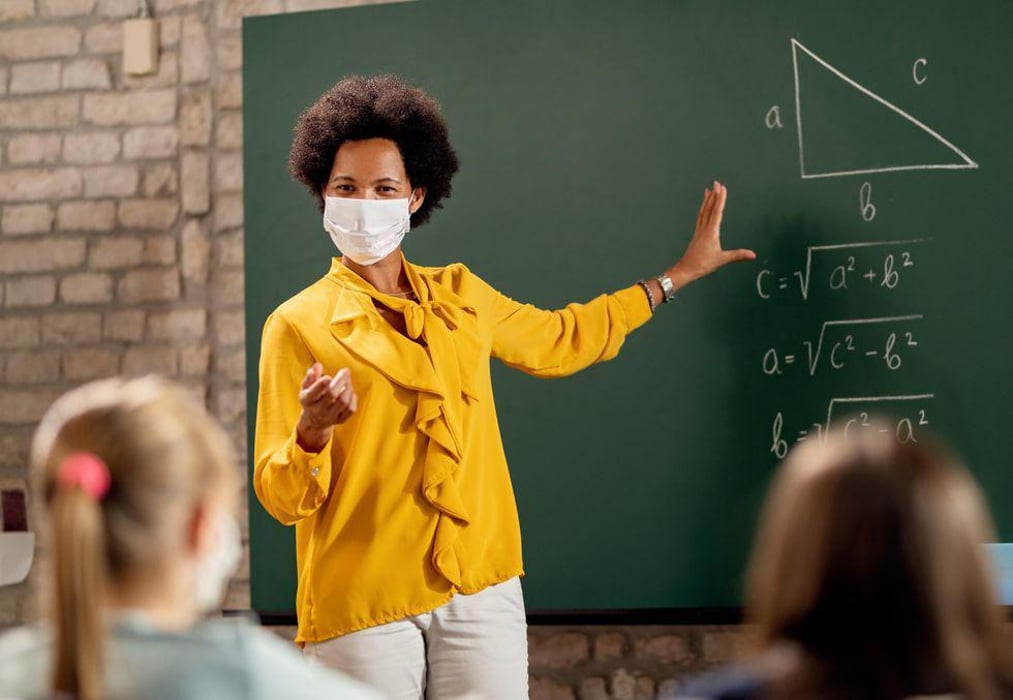Teachers Have No Higher Risk of Severe COVID-19: Study

THURSDAY, Sept. 2, 2021 (HealthDay News) -- As the new school year begins, teachers can take comfort in a new report that finds they have no greater risk of catching or being hospitalized for severe COVID-19 than anyone else.
Researchers in Scotland say that might be because many schools take precautions that other workplaces don't. It's also possible that the teachers in the study were younger and healthier than other workers, the authors said.
"Teachers are about average in terms of their risk of hospitalization with COVID-19, when compared to other working-age adults," said lead researcher Dr. David McAllister, a professor of clinical epidemiology and medical informatics at the Institute of Health and Wellbeing at the University of Glasgow. "Unlike health care workers, teachers are not at increased risk of hospitalization with COVID-19, even when schools are open."
Using data from March 2020 to July 2021, McAllister and his colleagues collected information on more than 132,000 people with COVID-19, ages 21 to 65, and more than 1.3 million people from the general population, all in Scotland. They compared the risk of COVID-19 among teachers and their family members with health care workers and others.
Over the study period, the risk of being hospitalized with COVID-19 was less than 1% for teachers, health care workers and other adults, the researchers found.
After taking into account factors such as age, sex, ethnicity and economic status, the risk of being hospitalized with COVID-19 was about 50% lower among teachers and their family members than among the general population, the researchers noted.
Over the same period, the risk was almost four times higher among health care workers and almost twice as high among their families, the researchers found.
During the first period of full school opening in the fall of 2020, the risk of hospitalization among teachers increased by 2.4-fold, reaching a level similar to that in the general population. By the summer of 2021, when vaccinations were underway, a smaller increase of 1.7 times was seen.
The report was published online Sept. 1 in the journal BMJ .
It's not surprising that the risk to teachers is not higher than other groups, said Douglas Harris, Schlieder Foundation Chair in public education at Tulane University in New Orleans, and director of the Education Research Alliance for New Orleans.
In schools where masks and social distancing are mandated, the risk of spreading COVID-19 is cut dramatically, he said.
"I think, for the most part, schools are handling it in a sensible way and I think, for the most part, it's sensible keeping the kids in school when it's safe," Harris said.
Of course, vaccination is the key to beating the pandemic, he added.
"I think in the U.S., there's an ongoing debate about whether vaccines can be mandated. That's the elephant in the room. I think that that almost has to happen if we're really going to get back to normal," Harris said.
Harris believes that school systems should mandate COVID-19 vaccinations for teachers and all students, including young children once a vaccine has been approved.
"We already do that for, for children, they're already required to get vaccinated for other things," he said. "It's hard to see why you wouldn't require it. In this case and really that is the only way we get back to normal, this could go on for years."
As more adults are vaccinated, the virus will attack mostly the unvaccinated, especially children, Harris said.
But everything should be done to minimize the spread of the virus and keep schools open, he said.
"There are health consequences to closing schools," Harris said. "We tend to focus on the immediate effect of schools opening and spreading the virus, which is clearly important and probably the first consideration, but when you close the schools you create a new set of problems, mental illness and child abuse, and all sorts of economic side effects."
More information
For more on COVID-19 and schools, see the U.S. Centers for Disease Control and Prevention.
SOURCES: David McAllister, MD, MPH, professor, clinical epidemiology and medical informatics, Institute of Health and Wellbeing, University of Glasgow, Scotland; Douglas Harris, PhD, professor, economics, and Schlieder Foundation Chair, public education, Tulane University, New Orleans, and director, Education Research Alliance for New Orleans; BMJ , Sept. 1, 2021, online
Related Posts
Las mordeduras de perros son más comunes los días calurosos y contaminados
VIERNES, 16 de junio de 2023 (HealthDay News) -- Igual que los humanos, los...
Incidence of Idiopathic Central Precocious Puberty Higher During COVID-19
WEDNESDAY, Aug. 9, 2023 (HealthDay News) -- The incidence of idiopathic central...
La FDA aprueba la primera terapia genética para tratar la distrofia muscular de Duchenne
VIERNES, 23 de junio de 2023 (HealthDay News) -- El jueves, la Administración de...
Severe Obesity Could Mean Faster Decline of Immunity From COVID Shot
FRIDAY, May 12, 2023 (HealthDay News) -- Severely obese people may need more...
